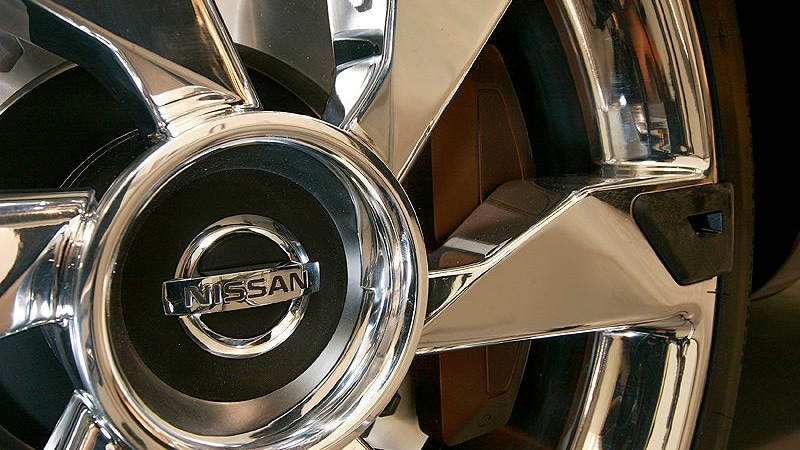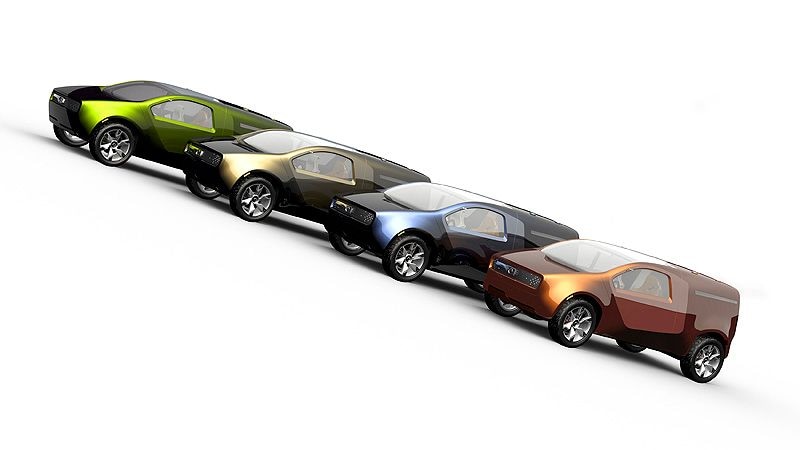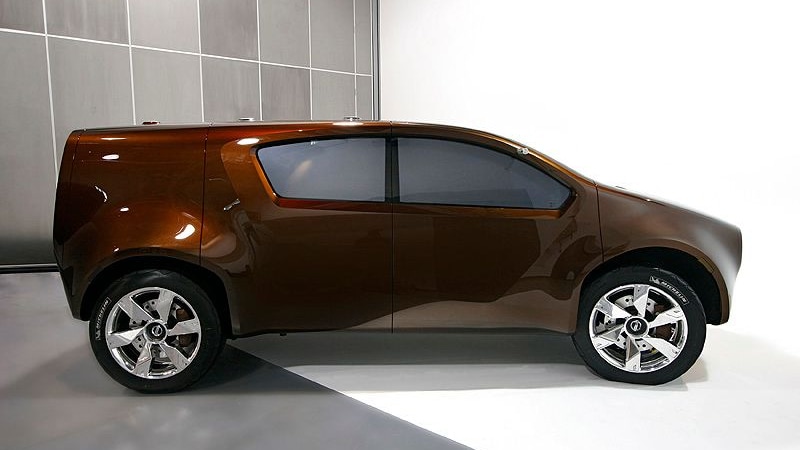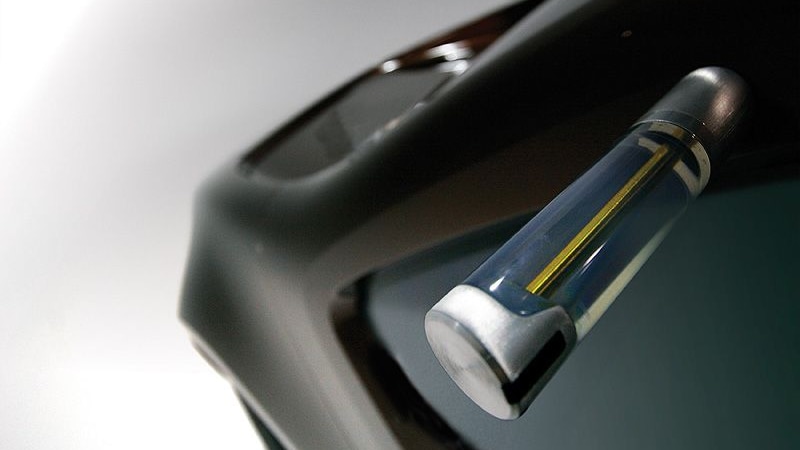Unique design elements include the asymmetrical styling, three-zone interior (comfort, utility and technology), glass roof-mounted solar panels and drive-by-wire steering, throttle and braking. The exterior is highlighted by a low front end and large windshield, flared wheel arches and 20inch wheels shod with Michelin rubber. One interesting feature is the rubber inserts on the outer edge of the alloys that protects the wheel against curb damage. The Bevel remains strictly a styling exercise as there’s no powertrain beneath the unsightly brown sheetmetal. Conceptually, the Bevel would feature a small, efficient 2.5L V6 that would offer both performance and fuel economy. This is one concept that seems to look worse the more you see it.
The fact that the car has a 360-degree pet leash swivel connection point and a large, removable "doggie hutch" pet carrier leaves us wondering what the design team were trying to achieve. Didn’t anyone realize that the entire thing looks like a steaming pile of something a doggie might leave behind?
Click here for our full gallery and the official press release.
Nissan Bevel Concept Carves Out a Space of Its Own
With Function-Inspired Design, Innovative Utility
The Nissan Bevel is a dynamic, multi-purpose vehicle – one designed to enhance every activity, every opportunity. But unlike currently available sport utility vehicles or minivans, which emphasize passenger needs and comfort, the advanced Bevel Concept's focus is placed strictly on the primary user – male empty-nesters actively engaged in hobbies, recreation and community service.
Conceived at Nissan Design America, Inc. (NDA) in La Jolla, California, in collaboration with Nissan advanced product planning groups in the United States, the Bevel Concept is an exploration of the future of the sport utility vehicle, going far beyond the current stereotypes.
"We see an opportunity to expand the range and values of the utility vehicle world," said Bruce Campbell, vice president design, NDA. "In the future, we envision "genres" where each product will be more dedicated and more focused, with the vehicles being much closer to the multi-dimensional aspects of the target buyers."
Bevel offers unique, function-inspired asymmetrical styling, a high-utility three-zone interior and technology ranging from glass roof-mounted solar panels to drive-by-wire steering, throttle and braking.
"Bevel is designed as a useful and rewarding vehicle for the 'Everyday Hero' – the guy who's always ready to help out a neighbor, a friend or around his community," said Campbell.
"These are men between 45 and 60 years of age with multiple personal interests. They don't need the heavy-duty utility of a pickup or room for a lot of passengers. In fact, they probably drive their vehicles alone more than 90 percent of the time. What they need is an extension of their toolboxes, workshops and garages – so they can easily take their work or hobbies on the road in comfort, style and with unlimited utility. The Bevel Concept is just that vehicle," he continued.
An Innovative, Asymmetrical Exterior
Bevel's compact exterior dimensions belie the immense utility inside. It rides on a 115.4-inch wheelbase, longer than the current Nissan Murano (111.2 inches) but shorter than the Nissan Quest (124.0 inches). Its short front and rear overhangs give it a manageable overall length of 173.2 inches, while width measures a full 75.0 inches. Overall height of 63.8 inches is nearly three inches shorter than Murano (66.5 inches), yet with Bevel's low load floor the total interior cargo height is the same as Murano.
Bevel's exterior is highlighted by a low front end and large windshield, large flared wheelwells with 20-inch wheels and 245/55R20 Michelin tires. The wheels feature rubber inserts on the outer spoke edges, visually extending the look of the tires while helping protect the wheels against curb damage.
The advantages of Bevel's asymmetrical styling are evident in the door layout. The driver's side door is extremely long and pivots on a special four-bar/two-position hinge designed for ease of entry and exit. A large driver's side window aids visibility. The driver's side rear body panel is solid, except for a narrow, horizontal upper window.
On the passenger side of Bevel's body are two doors, with the rear door hinged at the rear to provide an exceptionally wide door opening of nearly five-and-a-half feet (67.3 inches) from A-pillar to C-pillar – ideal for loading cargo, supplies or hobby equipment, such as a long-wingspan remote controlled airplane.
Bevel's tall one-piece rear hatch features a special horizontal hinge arrangement, with a height when raised of 6'2" from the ground. With the hatch open, a special tailgate-like work platform (about half of the width of the hatchback) folds down and snaps into place, creating a sturdy workbench-like area. This platform is strong enough to sit or stand on and has a quick-release design for easy removal and storage when not needed.
Located in the lower side edges of the rear cargo area, accessible with the hatch in the open position, is a pair of power outlets – a traditional 12V outlet and an 110V power tool recharging outlet, which is powered by Bevel's integrated solar cells mounted beneath the large glass roof panels.
"In creating Bevel, we studied how Everyday Heroes really use their vehicles – the loads, the size of their cargo, how they need protection from the rain when working outside," said Campbell. "Having a tailgate that a 6-foot-plus tall person can stand beneath while working under it adds tremendously to the vehicle's year-round utility."
Along with the oversize, asymmetrical glass roof, Bevel also features a unique roof cargo system. Six hexagon-shaped "pucks" with pop-up hooks are designed to carry loads up to 250 pounds – versus traditional roof rack systems' recommended load capacities of 60 pounds.
Other Bevel exterior features include hidden LCD headlights and projector fog lamps, LCD taillights integrated into the tailgate surround and hidden under the paint, breakaway fiber-optic side cameras in place of traditional sideview mirrors, a recessed rear license plate holder, hidden exhaust outlets and touch-sensitive door release keypads mounted in the door window glass.
"Our goal in designing the Bevel exterior was to maximize functionality and minimize the use of visual distractions such as door handles, big exhaust pipes or splashy lighting," said Campbell. "At the same time, we wanted the little details to reflect Bevel's utility theme, which is why there is a recurring use of hexagons in the vehicle's design – reminiscent of a socket or a tool – in the wheels, grille and even the disc brake venting."
Three Specific Interior Zones
Bevel's interior combines comfort, utility and technology – organized into three use-specific "zones." The first zone is the comfort zone (driver's area), with a comfortable, rich leather-appointed fixed seat. A section of the driver's side floor is connected to and moves out with the driver's door.
Also aiding driver ingress and egress is Bevel's "ribbon" instrument panel, which moves four inches forward and out of the way when the driver's door is opened – and back into position in front of the driver when the door is closed.
"Use of the moving or floating instrument panel ribbon was made possible by Bevel's drive-by-wire throttle, braking and steering," said Campbell. "This also allowed us to move the firewall forward by nearly a foot, creating additional room in front for both the driver and an occasional front seat passenger."
An integrated center console houses a control knob for the Nissan Xtronic CVT™ (Continuously Variable Transmission).
The second zone is the "command central" information/technology zone, designed to connect the driver with the Bevel and the outside world. The information-centric, fully digital instrument panel features a series of screens. Side LCD monitors, located on the outer edges of the instrument panel, display images from the sideview mirror cameras. The main center display offers adjustable image sizes and typefaces and can be switched between five information menus – Vehicle Information, HVAC, Navigation, Entertainment and Home – through use of the ribbon-mounted controller.
The "Entertainment" control center allows the driver to access phone settings, weather and traffic reports, Internet and personal e-mail accounts, and music – including satellite radio, MP3 files, CDs and the integrated speakers. From the "Home" control center, the driver can access a home network and monitor locks and security system, heat and air conditioning, appliance, room lighting and garage door status.
"The concept behind Bevel's information center is again adding a dimension of real world utility," said Campbell. "For example, if you are on your way home from a day of fly fishing, wouldn't it be great to be able to turn on or adjust the lights and heat in your house just before you get there?"
Bevel also includes a wireless tablet display computer, allowing connection with the information center when away from the instrument panel.
The third Bevel zone is the utility/pet zone. Bevel's flexible seating includes lightweight, aluminum-frame fold-flat front passenger and rear bench seat. Because they are likely to be kept in the folded position most of the time, the seat surfaces themselves are very simple yet durable, and the backsides of the seats are covered with the same material as the rear cargo area floor, creating one large, seamless front-to-rear utility surface. The flooring itself is constructed from laminated recycled walnut, creating an extremely hard, workbench-like surface.
"Our idea is to surround the driver with an appropriate level of comfort and luxury, but the rest of the Bevel is designed to get dirty, marred or marked. That's opposite of what is offered with most current utility vehicles," said Campbell. "You won't find a lot of cupholders or reading lamps in the rear of Bevel because you're much more likely to be carrying power saws than passengers."
Bevel does provide accommodations for one special class of passenger – pets. The front passenger area includes a 360-degree pet leash swivel connection point and a large, removable "doggie hutch" pet carrier is designed to fit securely in the rear cargo area.
The utility zone also includes a series of compartments and tie-down hooks, offering a high level of cargo-carrying flexibility.
"Bevel's interior can be used in so many ways, even as an additional storage for equipment between activities or uses, which is why we've limited glass areas to keep prying eyes out. Bevel really can be used like a second garage or workshop," said Campbell.
Conceptually, Bevel would feature a small, efficient 2.5-liter V6 with HEV, combining driving pleasure with environmentally friendly design.
"We believe that the Bevel target buyer is interested in both performance and fuel economy, so Bevel's powertrain would be selected with the goal of providing segment-leading MPG and the power of a larger V6," said Campbell.
A Study In Specialization
The Nissan Bevel Concept makes its world debut at the 2007 North American International Auto Show in Detroit – along side another all-new Nissan SUV design, the 2008 Nissan Rogue. The Rogue, Nissan's latest entry into the crossover SUV segment, shares Bevel's unique blending of a driver-focused cockpit with innovative utility.
"In many ways, Bevel and Rogue are designed for the same active, involved people, just at different stages in their lives," said Campbell. "While the Rogue buyer is just starting out with increased family and career responsibilities, Bevel's owner has more free time to devote to personal interests and activities. So often, as an industry, we ignore older buyers' needs – instead of embracing the fresh thinking that specialization can bring. We believe car enthusiasts of all ages are going to love Bevel."






